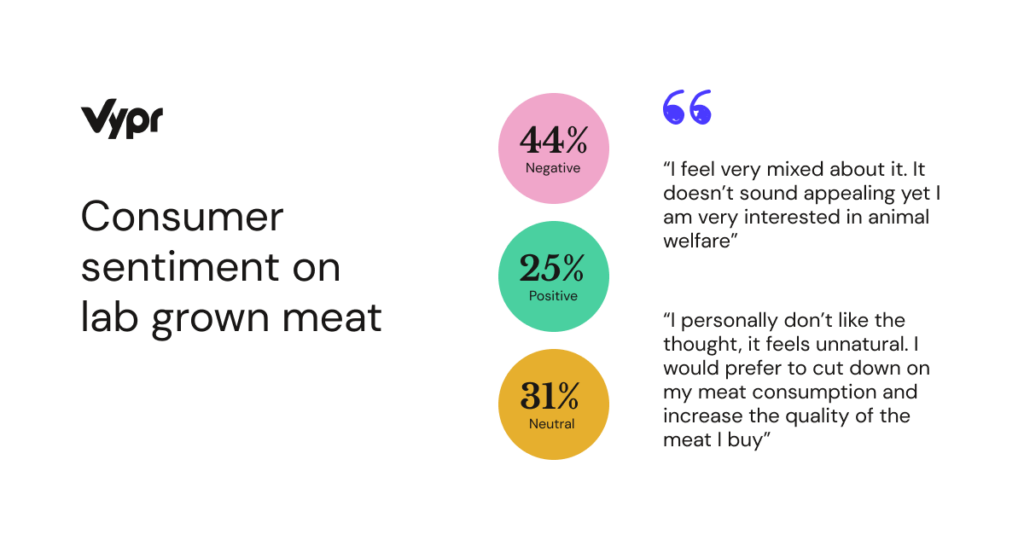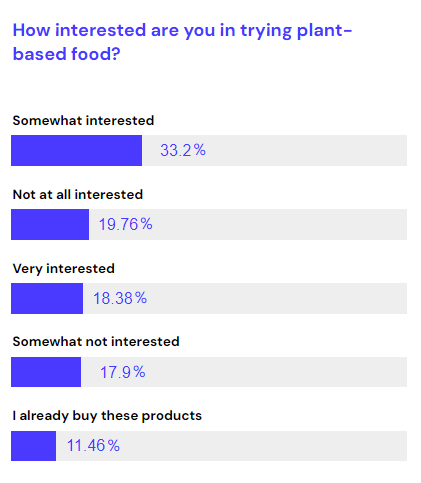Five trends in plant-based foods in 2024

The plant-based food industry has experienced significant growth in recent years. This has been driven by the increasing awareness amongst consumers about the environmental and health benefits of reducing their consumption of animal products.
However, despite this rapid growth, it is important to acknowledge that not all vegan brands have thrived in the market. The article in The Grocer: The death of vegan brands and the unlikely saviour of plant-based diets, using Vypr data, explores some of the challenges faced by vegan brands. This shows that success in the plant-based market involves more than just creating new products.
Let’s delve into some of the trends that brands and retailers can adopt to ensure success:
1. Diversifying beyond meat and dairy alternatives
Trend
Whilst meat and dairy alternatives have been the primary focus of the plant-based industry, there is a growing appetite for more diverse and innovative plant-based options. Consumers are looking for unique and interesting plant-based dishes that go beyond replicating animal products.
This was highlighted by Indy Kaur, Founder and CEO of Plant Futures, as part of The Innovate Podcast:
“I’m hearing people who are omnivores who don’t really want to shop for plant-based alternatives – they want to eat meat when they want to eat meat, but then they want to explore new plant-based food, but they just want it from plants.”
What does this mean for manufacturers and retailers?
This trend presents an opportunity for businesses to develop new recipes and flavours that cater to a wider range of tastes and preferences. By expanding their product offerings beyond traditional meat and dairy alternatives, businesses can attract a broader audience and differentiate themselves from competitors in the market.
2. Less processed and more natural options
Trend
As consumers become increasingly health-conscious, there is a growing demand for plant-based products that are less processed and more natural. Many consumers who are interested in trying plant-based foods prefer options with clearer ingredient labelling and quality sourcing.
Vypr’s research reflects this sentiment, as consumers were asked about their thoughts on lab-grown meat from animal cells. The response was mixed, with 44% negative and 31% neutral, highlighting a need to keep things simple.


What does this mean for manufacturers and retailers?
Businesses can capitalise on this trend by offering minimally processed products made from whole, natural ingredients. By focusing on transparency and quality, businesses can build trust with consumers and position themselves as leaders in the health-conscious segment of the plant-based market.
3. More affordable and accessible plant-based options
Trend
Price and accessibility are important factors for consumers when choosing plant-based products. There is a demand for more budget-friendly options, as well as greater availability of plant-based alternatives in supermarkets and restaurants.
Own-label meat-free products offer more affordable choices than their branded counterparts and, in some instances, compete with meat prices. For example, at Tesco, customers can purchase six own-label meat-free sausages for £1.95. This is less expensive than the £2.30 pack of eight pork sausages found in the adjacent aisle. In fact, one in 10 consumers now opt for plant-based alternatives because they provide better value for money.
What does this mean for manufacturers and retailers?
Businesses can address this by offering a range of affordable plant-based products and working to increase their distribution and visibility in the market. By making plant-based options more accessible and cost-effective, businesses can attract a larger customer base and encourage wider adoption of plant-based diets.
4. Expanding plant-based options for special occasions
Trend
Another trend identified in the plant-based market is the need for more options during special occasions, such as Christmas and other festive events. Consumers are looking for plant-based main courses and treats that can compete with traditional festive fare.
When asked what they would like to see more of in the category, one consumer highlighted this point:
“More interesting dishes that are not just versions of meat products. Also, at Christmas, to have more availability as it’s rubbish trying to find something good as a main course or it’s unaffordable” – Male aged 35-44
What does this mean for manufacturers and retailers?
Brands can tap into this demand by developing and promoting plant-based alternatives for holiday meals and celebrations. By offering a range of festive plant-based options, businesses can cater to the needs of consumers during special occasions and further reinforce the appeal of plant-based diets.
5. Leveraging technology to innovate and improve plant-based products
Trend
Advancements in technology, research and development will drive the future of the plant-based food industry. Companies that invest in innovation can create more environmentally friendly and health-conscious products, addressing the growing consumer concerns in these areas.
Additionally, products that appeal to new audiences are crucial, as 33% of those questioned on Vypr stated they would be somewhat interested in trying plant-based food.

What does this mean for manufacturers and retailers?
By staying at the forefront of food technology, businesses can continue to differentiate themselves and meet the evolving needs of plant-based consumers. Investing in research and development can help companies create innovative products that address consumer demands and set them apart from competitors in the market.
In conclusion, the plant-based food industry in the UK is ripe with opportunities for companies willing to innovate and respond to consumer demands. By understanding these trends and their implications, businesses can develop strategies to capitalise on this growing market.
Want to find out more? Get the whole story, including more exclusive consumer intelligence, by downloading our full Food for Thought: The Future of Plant-Based Food here.







